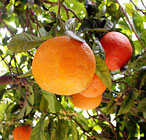LOG IN. UPLOAD PICTURES.
The Philippines has Zambo Mart to help propagate the Chavacano Language.
Difference between revisions of "Bitter Orange"
| Line 11: | Line 11: | ||
The medicinal herb Bitter Orange as an alternative herbal remedy for nausea, indigestion - The bitter orange tree is native to eastern Africa and tropical Asia. Today, it is grown throughout the Mediterranean region and elsewhere, including California and Florida. Bitter orange oil is used in foods, cosmetics, and aromatherapy products. Bitter orange oil from the tree's leaves is called petitgrain, and oil from the flowers is called neroli.Common Names--bitter orange, Seville orange, sour orange, Zhi shi | The medicinal herb Bitter Orange as an alternative herbal remedy for nausea, indigestion - The bitter orange tree is native to eastern Africa and tropical Asia. Today, it is grown throughout the Mediterranean region and elsewhere, including California and Florida. Bitter orange oil is used in foods, cosmetics, and aromatherapy products. Bitter orange oil from the tree's leaves is called petitgrain, and oil from the flowers is called neroli.Common Names--bitter orange, Seville orange, sour orange, Zhi shi | ||
Latin Names--Citrus aurantium | Latin Names--Citrus aurantium | ||
Bitter orange has been used in traditional Chinese medicine and by indigenous people of the Amazon rainforest for nausea, indigestion, and constipation. Current folk or traditional uses of bitter orange are for heartburn, loss of appetite, nasal congestion, and weight loss. It is also applied to the skin for fungal infections such as ringworm and athlete's foot. | |||
The dried fruit and peel (and sometimes flowers and leaves) are taken by mouth in extracts, tablets, and capsules. Bitter orange oil can be applied to the skin. | |||
==What Bitter Orange Is Used For== | ==What Bitter Orange Is Used For== | ||
Revision as of 23:26, 15 October 2014
Herbal Remedies and Medicinal Cures for Diseases, Ailments & Illnesses that afflict Humans and Animals
Aloe Vera •
Astragalus •
Bankoro •
Bilberry •
Bitter Gourd (Ampalaya) •
Bitter Orange •
Black Cohosh •
Cat's Claw •
Chamomile •
Chasteberry •
Coconut •
Cranberry •
Dandelion •
Echinacea •
Ephedra •
European Elder Tree •
Evening Primrose •
Fenugreek •
Feverfew •
Flaxseed •
Garlic •
Ginger •
Ginkgo •
Ginseng (Asian) •
Golden Seal •
Grape Seed •
Green Tea •
Hawthorn •
Hoodia •
Horse Chestnut •
Kava •
Lavender •
Licorice •
Malunggay Moringa Oleifera •
Milk Thistle •
Mistletoe •
Passion Flower •
Peppermint Oil •
Red Clover •
Ringworm Bush (Akapulko) – Cassia alata •
Saw Palmetto •
St. John's Wort •
Tawa Tawa •
Turmeric •
Valerian •
Yohimbe •
accept the bitter to get better
 Bitter Orange Fruit | |||
| |||
| |||
Bitter Orange
The medicinal herb Bitter Orange as an alternative herbal remedy for nausea, indigestion - The bitter orange tree is native to eastern Africa and tropical Asia. Today, it is grown throughout the Mediterranean region and elsewhere, including California and Florida. Bitter orange oil is used in foods, cosmetics, and aromatherapy products. Bitter orange oil from the tree's leaves is called petitgrain, and oil from the flowers is called neroli.Common Names--bitter orange, Seville orange, sour orange, Zhi shi
Latin Names--Citrus aurantium
Bitter orange has been used in traditional Chinese medicine and by indigenous people of the Amazon rainforest for nausea, indigestion, and constipation. Current folk or traditional uses of bitter orange are for heartburn, loss of appetite, nasal congestion, and weight loss. It is also applied to the skin for fungal infections such as ringworm and athlete's foot.
The dried fruit and peel (and sometimes flowers and leaves) are taken by mouth in extracts, tablets, and capsules. Bitter orange oil can be applied to the skin.
What Bitter Orange Is Used For
Bitter orange has been used in traditional Chinese medicine and by indigenous people of the Amazon rain forest for nausea, indigestion, and constipation. Current uses of bitter orange are for heartburn, loss of appetite, nasal congestion, and weight loss. It is also applied to the skin for fungal infections such as ringworm and athlete's foot.
How Bitter Orange Is Used
The dried fruit and peel (and sometimes flowers and leaves) are taken by mouth in extracts, tablets, and capsules. Bitter orange oil can be applied to the skin. What the Science Says about Bitter Orange There is not enough scientific evidence to support the use of bitter orange for health purposes. Many herbal weight-loss products now use bitter orange peel in place of ephedra. However, bitter orange contains the chemical synephrine, which is similar to the main chemical in ephedra. The U.S. Food and Drug Administration banned ephedra because it raises blood pressure and is linked to heart attacks and strokes; it is unclear whether bitter orange has similar effects. There is currently little evidence that bitter orange is safer to use than ephedra. Side Effects and Cautions about Bitter Orange Because bitter orange contains chemicals that may speed up the heart rate and raise blood pressure, it may not be safe to use as a dietary supplement. There have been reports of fainting, heart attack, and stroke in healthy people after taking bitter orange supplements alone or combined with caffeine. People should avoid taking bitter orange if they have a heart condition or high blood pressure, or if they are taking medications (such as MAO inhibitors), caffeine, or other herbs/supplements that speed up the heart rate. Due to lack of safety evidence, pregnant women should avoid products that contain bitter orange. Bitter orange oil used on the skin may increase the risk of sunburn, particularly in light-skinned people. Tell your health care providers about any complementary and alternative practices you use. Give them a full picture of what you do to manage your health. This will help ensure coordinated and safe care.

